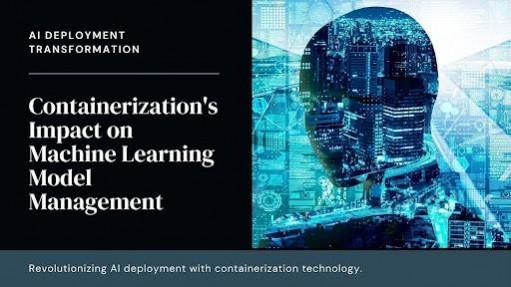
Machine learning (ML) adoption necessitates efficient, scalable deployment solutions. Despite its potential to drive innovation, businesses struggle with ML model deployment and management in production. IDC reports that 28% of ML projects fail due to implementation and scalability issues, underscoring the need for better deployment strategies. Sailesh Oduri's article explores how containerization technologies like Docker and Kubernetes can address these challenges, revolutionizing the ML model by enhancing deployment consistency, scalability, collaboration, and security.
Containerization: A Game Changer for ML Deployment
Containerization tools like Docker encapsulate ML models, their dependencies, and runtime configurations in lightweight, portable units called containers. This encapsulation ensures that deployments are uniform and repeatable across different environments, from development to production. The significance of this approach is underscored by a Forrester study, which found that 66% of companies using containers experienced more consistent and reliable application deployments.
The portability of containers facilitates seamless transitions between hybrid and multi-cloud environments. This is crucial as 63% of businesses adopt a hybrid cloud strategy, according to 451 Research. Containerization allows ML models to be consistently deployed in both on-premises data centers and public cloud platforms like Google Cloud Platform (GCP), Amazon Web Services (AWS), and Microsoft Azure.
Kubernetes: Scaling and Resource Efficiency
Kubernetes, an orchestration tool for containerized applications, enhances the scalability and resource efficiency of ML model serving. Kubernetes' auto-scaling capabilities allow companies to automatically adjust the number of containerized model serving instances in response to workload changes. Airbnb's use of Kubernetes exemplifies this benefit, enabling them to handle ten times more inference requests during peak times without manual intervention.
Moreover, Kubernetes optimizes resource utilization through efficient container scheduling and packing. A Google Cloud study revealed that users employing Kubernetes for their ML workloads saved an average of 25% on infrastructure costs compared to traditional deployment methods. This optimization is vital for cost-effective ML operations, as highlighted by Deloitte, which identifies infrastructure costs as a significant challenge for 50% of businesses scaling ML projects.
Enhancing Collaboration and CI/CD Integration
Containerization fosters better collaboration between data scientists and DevOps teams by standardizing the deployment process. Data scientists can focus on building models, while DevOps teams manage the deployment and orchestration of containerized ML models. This collaborative approach is crucial, as a study by Databricks indicates that 68% of companies face challenges in data science and DevOps collaboration, hindering ML model deployment.
Integrating containerized ML models into CI/CD pipelines streamlines development, with an American transportation company reporting a fivefold increase in updates and reduced release times from weeks to minutes. This ensures consistent environments, minimizing discrepancies between development and production, and addressing common deployment issues.
Security and Isolation
Containerization significantly enhances the security and isolation of ML model serving. Each model inference request operates within a secure, isolated environment, reducing the risk of interference and resource contention between models. According to the National Institute of Standards and Technology (NIST), containerization reduces the attack surface by 80% compared to traditional monolithic deployments.
Containers are particularly beneficial in multi-tenant environments, where multiple users or applications share the same infrastructure. Gartner reports that 70% of companies deploying ML models operate in multi-tenant settings. Containerization ensures that each model runs in a separate environment, preventing unauthorized access and data leakage.
Additionally, containerization enables fine-grained security and access controls. Kubernetes' role-based access control (RBAC) and network policies allow companies to enforce strict security measures. A study from a major financial institution demonstrates that containerization reduced compliance violations related to ML model deployment by 95%.
To wrap up, containerization and ML model serving, using Docker and Kubernetes, offer scalable solutions for deploying and managing ML models. This approach ensures consistent deployments, optimizes resources and enhances collaboration and security. As ML evolves, these technologies will be crucial for scaling ML projects, and driving innovation and growth across industries.
















